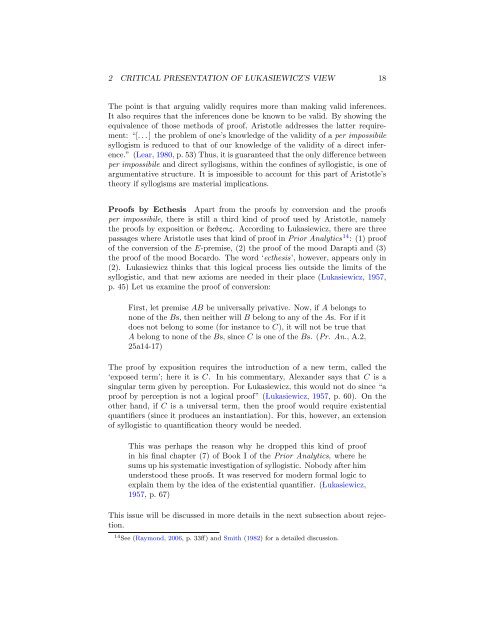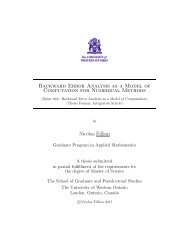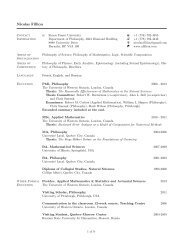Two Accounts of Aristotle's Logic - Nicolas Fillion
Two Accounts of Aristotle's Logic - Nicolas Fillion
Two Accounts of Aristotle's Logic - Nicolas Fillion
Create successful ePaper yourself
Turn your PDF publications into a flip-book with our unique Google optimized e-Paper software.
2 CRITICAL PRESENTATION OF ̷LUKASIEWICZ’S VIEW 18<br />
The point is that arguing validly requires more than making valid inferences.<br />
It also requires that the inferences done be known to be valid. By showing the<br />
equivalence <strong>of</strong> those methods <strong>of</strong> pro<strong>of</strong>, Aristotle addresses the latter requirement:<br />
“[. . . ] the problem <strong>of</strong> one’s knowledge <strong>of</strong> the validity <strong>of</strong> a per impossibile<br />
syllogism is reduced to that <strong>of</strong> our knowledge <strong>of</strong> the validity <strong>of</strong> a direct inference.”<br />
(Lear, 1980, p. 53) Thus, it is guaranteed that the only difference between<br />
per impossibile and direct syllogisms, within the confines <strong>of</strong> syllogistic, is one <strong>of</strong><br />
argumentative structure. It is impossible to account for this part <strong>of</strong> Aristotle’s<br />
theory if syllogisms are material implications.<br />
Pro<strong>of</strong>s by Ecthesis Apart from the pro<strong>of</strong>s by conversion and the pro<strong>of</strong>s<br />
per impossibile, there is still a third kind <strong>of</strong> pro<strong>of</strong> used by Aristotle, namely<br />
the pro<strong>of</strong>s by exposition or ἔκθεσις. According to ̷Lukasiewicz, there are three<br />
passages where Aristotle uses that kind <strong>of</strong> pro<strong>of</strong> in Prior Analytics 14 : (1) pro<strong>of</strong><br />
<strong>of</strong> the conversion <strong>of</strong> the E-premise, (2) the pro<strong>of</strong> <strong>of</strong> the mood Darapti and (3)<br />
the pro<strong>of</strong> <strong>of</strong> the mood Bocardo. The word ‘ecthesis’, however, appears only in<br />
(2). ̷Lukasiewicz thinks that this logical process lies outside the limits <strong>of</strong> the<br />
syllogistic, and that new axioms are needed in their place (̷Lukasiewicz, 1957,<br />
p. 45) Let us examine the pro<strong>of</strong> <strong>of</strong> conversion:<br />
First, let premise AB be universally privative. Now, if A belongs to<br />
none <strong>of</strong> the Bs, then neither will B belong to any <strong>of</strong> the As. For if it<br />
does not belong to some (for instance to C), it will not be true that<br />
A belong to none <strong>of</strong> the Bs, since C is one <strong>of</strong> the Bs. (Pr. An., A.2,<br />
25a14-17)<br />
The pro<strong>of</strong> by exposition requires the introduction <strong>of</strong> a new term, called the<br />
‘exposed term’; here it is C. In his commentary, Alexander says that C is a<br />
singular term given by perception. For ̷Lukasiewicz, this would not do since “a<br />
pro<strong>of</strong> by perception is not a logical pro<strong>of</strong>” (̷Lukasiewicz, 1957, p. 60). On the<br />
other hand, if C is a universal term, then the pro<strong>of</strong> would require existential<br />
quantifiers (since it produces an instantiation). For this, however, an extension<br />
<strong>of</strong> syllogistic to quantification theory would be needed.<br />
This was perhaps the reason why he dropped this kind <strong>of</strong> pro<strong>of</strong><br />
in his final chapter (7) <strong>of</strong> Book I <strong>of</strong> the Prior Analytics, where he<br />
sums up his systematic investigation <strong>of</strong> syllogistic. Nobody after him<br />
understood these pro<strong>of</strong>s. It was reserved for modern formal logic to<br />
explain them by the idea <strong>of</strong> the existential quantifier. (̷Lukasiewicz,<br />
1957, p. 67)<br />
This issue will be discussed in more details in the next subsection about rejection.<br />
14 See (Raymond, 2006, p. 33ff) and Smith (1982) for a detailed discussion.




